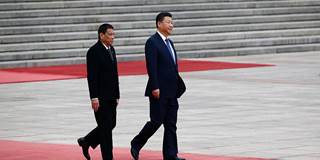Many people seem to believe that authoritarian rulers deliver better economic results. And yet, with the possible exception of China's Xi Jinping, Asia’s autocrats, from India to the Philippines, are presiding over increasingly fragile states and even more vulnerable economies.
NEW DELHI – US President Donald Trump grabs the most headlines, but the cult of the strongman leader is most developed in Asia. The continent abounds with rulers – including Indian Prime Minister Narendra Modi, Philippine President Rodrigo Duterte, Turkish President Recep Tayyip Erdoğan, and the strongest of them all, Chinese President Xi Jinping – who make a virtue of centralizing power.
Obviously, leadership styles vary. But all of Asia’s strongmen share a key characteristic: they secure public support by preying on economic ignorance. In particular, they trade on the popular belief that leaders who concentrate political power are freer to guide economic growth. For the most part, people accept this claim, expecting that financial gain and “development” will be their reward.
Curiously, markets have also accepted this flawed reasoning. Global investors tend to overlook human rights, and to prefer stability and autocratic resolve to the unpredictability of democracy. Equity and currency markets regularly punish countries for even a hint of political upheaval, whereas rulers with more power and fewer checks and balances are assumed to be more capable of ensuring meaningful “reforms.”

NEW DELHI – US President Donald Trump grabs the most headlines, but the cult of the strongman leader is most developed in Asia. The continent abounds with rulers – including Indian Prime Minister Narendra Modi, Philippine President Rodrigo Duterte, Turkish President Recep Tayyip Erdoğan, and the strongest of them all, Chinese President Xi Jinping – who make a virtue of centralizing power.
Obviously, leadership styles vary. But all of Asia’s strongmen share a key characteristic: they secure public support by preying on economic ignorance. In particular, they trade on the popular belief that leaders who concentrate political power are freer to guide economic growth. For the most part, people accept this claim, expecting that financial gain and “development” will be their reward.
Curiously, markets have also accepted this flawed reasoning. Global investors tend to overlook human rights, and to prefer stability and autocratic resolve to the unpredictability of democracy. Equity and currency markets regularly punish countries for even a hint of political upheaval, whereas rulers with more power and fewer checks and balances are assumed to be more capable of ensuring meaningful “reforms.”